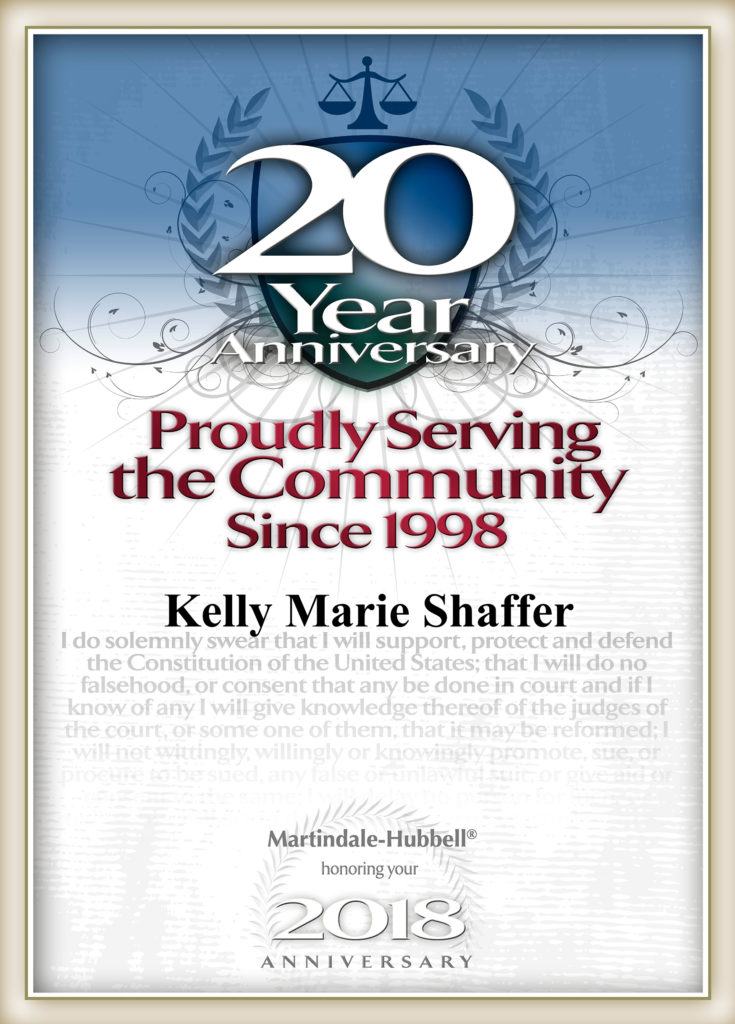Chandler Property Division Attorney
Our family law attorney with 20+ years experienced has served families in Chandler, Tempe, Mesa, Gilbert, and Scottsdale, and other cities in the Maricopa County for property division and other family law matters
Division of Assets and Debts
Because Arizona is a community property state, division of assets and debts in divorce can pose a significant challenge. Many factors can affect the final property settlement. At Shaffer Family Law, we have achieved equitable property settlement agreements for countless clients in situations that span a wide range of marital asset levels. Often the complexities of divorce are amplified by concerns regarding a division of assets and debts. This is especially true for clients with high-value property and significant individual and marital investments and debt, including:
- Investment assets
- Family-owned businesses and closely held corporations
- Professional practice interests, inventory, and investments
- High-value homes such as vacation homes and investment real estate
- IRS tax debt
- Credit card debt
At Shaffer Family Law, we focus exclusively on family law matters. Our attorneys have extensive experience litigating divorce cases, drafting marital agreements and handling divorce and property settlements. We ensure that all aspects of your family law case, including financial matters, are fully developed prior to the final divorce decree. We represent individuals throughout Maricopa County and provide comprehensive legal services related to property division in a divorce.
Community Property vs. Separate Property
Community property describes all assets (and debts) that were jointly acquired during the marriage. Each spouse is seen as contributing equally, regardless of individual income, so community property is divided evenly. This means that each spouse receives one-half of these assets, which can include money, real estate, retirement plans, furniture, automobiles, and possessions.
Separate property is a property that belongs to one spouse and is not subject to division in a divorce. This includes property that a spouse brought to the marriage (a house, a business, pension funds) or assets or debts acquired in the name of one spouse during the marriage (an inheritance, personal injury award, or education loans).
Arizona Division of Debt Attorneys
We work with professional appraisers, accountants, and actuaries to properly value marital assets, then work diligently with you to tailor an innovative and fair proposal, or properly evaluate the other party’s proposal. Our experience, skill, knowledge, and ability to fashion tailored settlement agreements to meet your needs are part of the professional legal services we provide.
Shaffer Family Law is committed to protecting your marital rights and to ensuring that you receive an equitable distribution of all assets and debts. Our experienced divorce attorneys can help ensure that property division is fair by identifying all relevant factors and identifying and assigning ownership and correct valuations to all assets and liabilities, including, when appropriate, the use of forensic accountants to locate hidden assets, business valuation experts, and other financial experts.
Learn more below about property division or contact Shaffer Family Law to consult with us about the division of assets and debts in your family law case.
Shaffer Family Law is dedicated to helping people throughout Maricopa County and surrounding communities.
Community Property
Arizona is one of a handful of "community property" states in which any assets acquired by a husband or wife during their marriage are considered community property, subject to equal division upon divorce. Spouses can make a mutual decision to avoid this outcome, such as by using a prenuptial agreement. Otherwise, Arizona law will dictate how property is divided.
In some respects, the concept of community property simplifies the matter of property division. There is no need to argue about who contributed more to the acquisition of an asset. If a marital property in Arizona were a pie, there would be no inquiry as to who bought the ingredients or did the work of baking it. It would simply be divided in half, with each party receiving an equal share upon divorce. During the marriage, however, each party has an equal and undivided interest in all community property.
Arizona also recognizes the concept of "quasi-community property," or property acquired in another state during the marriage, which, had it been acquired in Arizona, would be community property. An example would be a car purchased in another state during the marriage. Quasi-community property is divided as if it were community property.
Understanding Marital and Separate Property in Arizona
The only property that is "marital" is subject to division as community property. Another property is considered separate. What does "marital property" mean? Essentially, marital property is property acquired by either spouse or both spouses, during the marriage, regardless of the name in which the property is titled. There are exceptions to this rule, most notably property one party receives during the marriage by gift or inheritance. Such property is considered separate, but it may be commingled with community property, after which it is treated as community property. An example would be an inheritance of $10,000 received by one spouse but deposited into the couple's joint checking account.
Property acquired by either party before the marriage begins or after it ends is considered separate property. The beginning of a marriage is usually obvious, but when does Arizona consider a marriage over for the purposes of classifying property as marital or separate?
Complex Property Issues in Arizona Divorce
At Shaffer Family Law, we know that even a seemingly straightforward divorce is still a monumental event for our clients. When divorce is complicated by complex property issues and significant assets, the process can be even more overwhelming. Our attorneys have dealt with many Arizona high-asset divorces and divorces involving complicated property issues. Our experience allows us to offer clients knowledgeable guidance and a road map for the Arizona divorce process.
Experience with High-Asset Divorce and Business Valuation Cases
One frequent concern in a high-asset or complex divorce is that one spouse may be concealing assets from the other. We are skilled at conducting discovery and interpreting data in order to unearth all holdings and property. As needed, we enlist the support of financial professionals, including forensic accountants, to trace assets, even those concealed outside of the country.
Another common issue is the valuation of a closely-held or family business. An inaccurate valuation can result in one party being unfairly deprived of marital property, while the other receives a windfall. It is critical that a business be appraised not just by a professional, but by a professional with knowledge and experience in the type of business at issue. We work with a variety of respected business valuation experts so that we can ensure that this complex undertaking is addressed correctly.
Other property issues in Arizona divorce cases often include the division of stock portfolios, pensions, and retirement accounts; division of significant debt; disputes over the date of separation (marital cut-off date); interpretation and enforcement of prenuptial agreements; and the impact of property division on the need for spousal support or alimony.
Serving California Professionals and Business Owners
Our clients include professionals, entrepreneurs, and business owners in the Valley and throughout Maricopa County. We are trusted because of our comprehensive approach to complex property issues. Mindful of our clients' resources, we are thorough and efficient in gathering information needed to resolve property disputes. Armed with this data, we are prepared to negotiate a property settlement that is favorable to our clients. Negotiation often produces a resolution that is quicker, less stressful, and less expensive than litigation. However, we also understand that cases involving significant or complex assets can be extremely contentious. We are experienced and accomplished litigators, well-prepared to advocate in court for our clients' Arizona property rights if needed.
Property Issues for Unmarried Couples
Many Arizona couples live together for years or decades without choosing to marry. In their time together, the lives of such couples become intertwined, including their financial lives. If a cohabiting couple separates, the parties do not have in place the same legal protections that married couples do, but that doesn't mean they have no options or rights.
Shaffer Family Law is experienced in protecting the rights of formerly-cohabiting partners who were never legally married. As with our divorce practice, we enlist the services of business valuation professionals, appraisers, and others to get a comprehensive picture of the assets and debt involved in a given case. The law governing cohabitation is very different, but our level of preparation is equally meticulous.
Property Division Without Community Property Laws
Because Arizona law regarding "community property" does not apply to unmarried couples, we need to take a different approach when working with clients who have not been married. Many of our clients are concerned that they've invested years of their lives with a partner only to be cast aside with nothing.
We work with clients to explain their legal rights to property acquired with a cohabiting partner, and their options for pursuing those rights. The assets at issue may be considerable, including:
- The home shared with the partner, or other real estates
- Retirement accounts, pensions, and other benefits
- Business interests, including professional practices
- Investments, stocks, and bonds
- Vehicles
- Art and collectibles
We also work with clients who believe that an unmarried partner might wrongfully pursue assets to which he or she is not entitled. Whatever our client's position, we offer an honest, straightforward analysis of the strengths and weaknesses of the case.
Couples may have signed a cohabitation agreement that addresses some or all of their property division issues. In most cases, an Arizona court will honor such agreements. If there is a dispute, such as over the value of certain property, whether the agreement includes certain property, or whether there was a breach of the agreement, it may be necessary to mediate or litigate. Insofar as possible, we will help our clients choose the least expensive and least stressful path to resolving their dispute. However, if a fair resolution cannot be reached by negotiation, we will not hesitate to fight for our clients' rights at trial.
Contact Us For a
Consultation

Contact a Chandler property division lawyer
Call Shaffer Family Law at (480) 470-3030 to find out how an experienced Chandler property division lawyer can help you with all documentation and represent you in the court.

